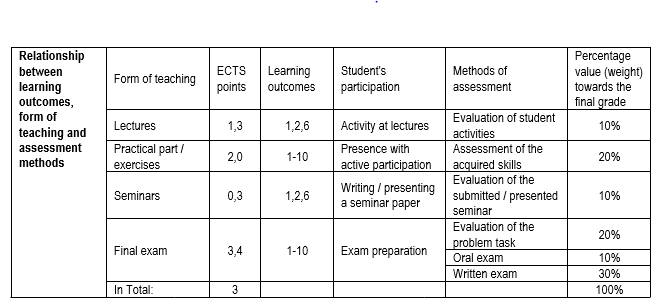The course goal is to ensure for a student the acquiring bachelors’ competences in nursery in modern, whole nursing care of healthy and sick children and their families, respecting physical, psycho-sociological, mental and cultural specifics and factors that can affect children's health/sickness.
Children’s health care philosophy
Children'scare in modern society
Children’s rights convention, children’s rights in hospital
Parenting stiles, parents’ attitude towards their child, parents’ attitudes toward child with special needs/chronic sick child
Period in children’s age, specifics of children’s organism
Children’s psychomotor development, estimation of growth and development
Children’s emotional development, attachment development, self-respect development
Children’s health care process, theories about children’s health care
Children’s hospitalisation, performance algorithm of health care workers with the assumption of abuse
Infant’s diet and children’s diet, whole child inspection, principals in children’s therapy giving
Active and passive immunization
Communication with a child and a parent/guardian
Children’s health care with acute and chronic diseases (classification based on body systems)
Special types of behavioural disturbances in children’s age
Child with intellectual difficulties
Assessment and children’s pain treating modes
Urgent states in pediatrics
Health care of vitally endangered child
Health care of a child in end-stage disease
Obavezna literatura:
- Lovrić R. Zdravstvena njega djeteta. Nastavni tekstovi
- Potts NL, Mandleco BL. Pediatric Nursing: Caring for Children and Their Families. New York: Delmar/Thomson Learning; 2002.
- Turuk V. Zdravstvena njega djeteta (nastavni tekstovi). Zagreb: Zdravstveno veleučilište; 2009.
Dopunska literatura:
- Carpenito LJ. Handbook of nursing diagnosis. 14. izd. Philadelphia: J.B. Lippincot Company; 2012.
- Bokonjić D, Milutinović D. Osnovi pedijatrijske njege. Banja Luka: Temus; 2011.
- Meštrović J, i sur. Hitna stanja u pedijatriji. Zagreb: Medicinska naklada; 2011.
- Mardešić D. Pedijatrija – udžbenik za medicinske škole. Zagreb: Školska knjiga; 2005.
- Mardešić D, i sur. Pedijatrija. Zagreb: Školska knjiga; 2009. (izabrana poglavlja)
- Švel I, Grgurić J. Zdravstvena zaštita djece. Zagreb: Školska knjiga; 1996. (izabrana poglavlja)
- Švel I, Grgurić J. Zdravstvena zaštita kronično bolesnoga djeteta. Zagreb: Barbat; 1998. (izabrana poglavlja)
- Juretić M, Livio B, i sur. Pedijatrija za više medicinske sestre. Split: Klinička bolnica Split; 1995.
- Audy-Kolarić Lj, i sur. Anestezija i intenzivno liječenje novorođenčadi. Zagreb: Školska knjiga; 1994. (izabrana područja)
- Audy-Kolarić Lj, i sur. Hitna stanja u pedijatriji. Zagreb: Školska knjiga; 2001. (izabrana područja)
- Zergollern Lj, i sur. Pedijatrija 1,2. Zagreb: Naprijed; 1994
- Broadwell Jackson D, Saunders BR. Child Health Nursing: A Comprehensive Approach to the Code of Children and Their Families. Philadelphia: Lippincott Williams and Wilkins;1993.
- Čuturić N. Prve tri godine života. Zagreb: Školska knjiga; 1991.
- Maleš D, Starčević I. Druženje djece i odraslih. Zagreb: Grafički zavod Hrvatske; 1991.
- Bastašić Z. Lutka ima i srce i pamet. Zagreb: Školska knjiga; 1990.
Upon completion of this course, students will be able to:
1. explain the stages of psychomotor development of the child's psychomotor development and possible difficulties;
2. interpret the peculiarities of acute, chronic, and life-threatening diseases, which are important when assessing the child's health condition;
3. implement the process of nursing care of the child and parents/guardians; assessment of physical, psychological and educational needs, goal setting, planning and implementation of procedures, evaluation;
4. apply nursing care procedures independently and/or in a professional team in accordance with the principles of pediatric nursing care (maximum quality, safety of the child safety, prevention of hospitalism and hospital infections), and standards and legal regulations;
5. manage documentation from the field of child health care;
6. argue the effects of hospitalization on the child and parents/guardians;
7. carry out prescribed and therapeutic procedures independently and/or in a professional team;
8. apply ethical principles and communication skills in working with the child and parents/guardians;
9. support the rights of children and parents/guardians in the hospital and in modern society;
10. evaluate standards of nursing practice with the aim of improving quality.



